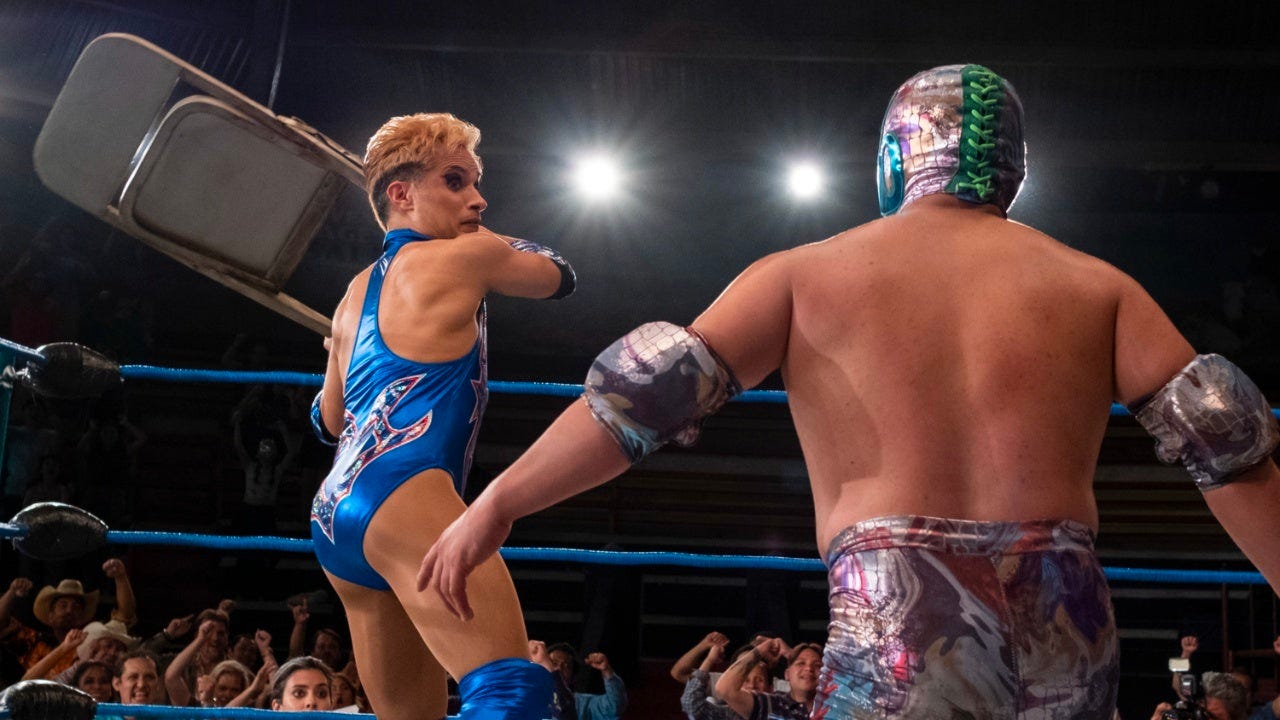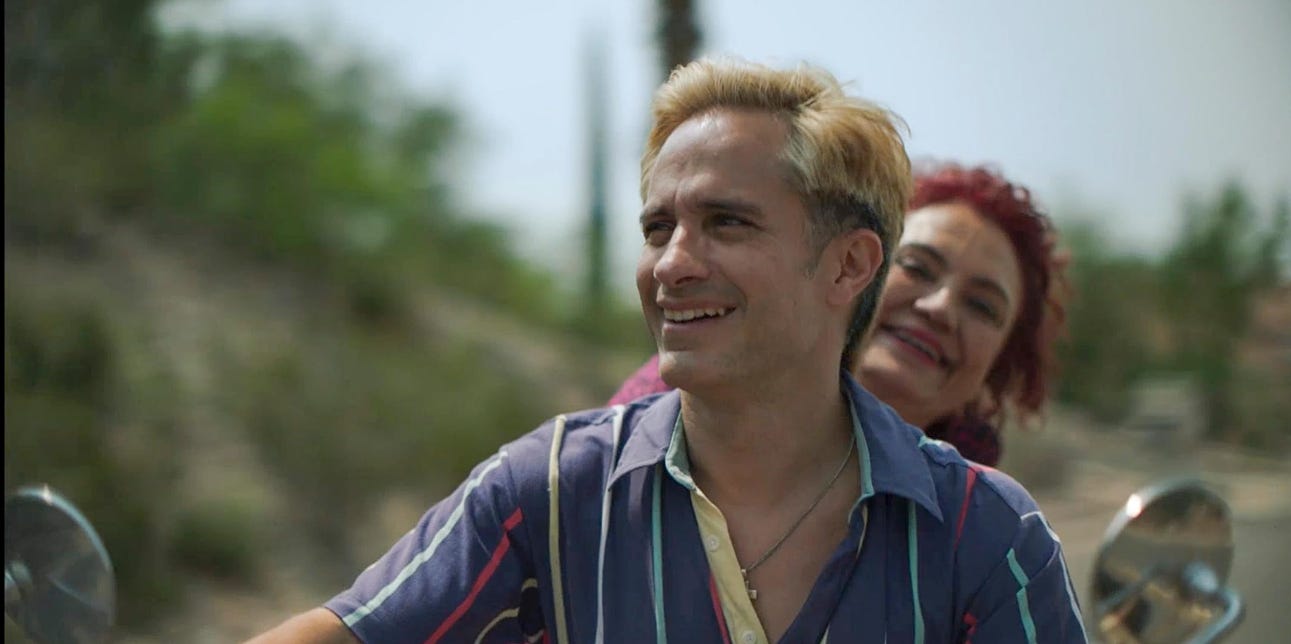Review: Macho Libre
Roger Ross Williams’ ‘Cassandro’ invigorates the sports biopic with joyful, fearless queerness
The Yearning Rating: ✰✰✰½
Romance: ✰✰½
Sex: ✰✰✰
Storytelling: ✰✰✰✰
Performance: ✰✰✰✰
Yearning: ✰✰✰✰½
Reminder that this Saturday we are having our BIG GAY PARTY! It's at Ginger’s and starts at 8:30 PM. If you’re in NYC, come celebrate our birthday with us and talk to some hot, gay writers! More details here <3
Some spoilers below!
Written by Meg Steinfeld-Heim
I didn’t know that much about Cassandro before I sat down in the Downtown Brooklyn Alamo last Tuesday to watch it. Gab and I got there early to enjoy the edited pre-show reel of fabulous, glittery luchadores (or professional Mexican wrestlers) grappling with each other in energetic archival footage. But the vibrant energy of the movie is palpable from just the press posters. Cassandro sits proudly, fiercely, with one leg crossed atop the ropes of a wrestling ring. He’s bedecked in shiny silver boots and a turquoise train of fabric waterfalls gracefully to the floor. It’s peacockian in the best way.
Set in the ‘80s, Cassandro begins by introducing us to our hero and the true story inspiration for this movie, Saúl Armendáriz. Saúl (played by the charming Gael García Bernal), is a cheerful and openly gay amateur wrestler who lives in El Paso, Texas with his mom but regularly crosses the border to Mexico to participate in lucha libre wrestling matches.
Lucha libre, which translates roughly to “freestyle wrestling”, or literally to “free fight”, is the style of professional wrestling that originated in Mexico. Since becoming part of Mexican culture in the early 20th century, it has fostered its own unique corner of the wrestling world—one often characterized by colorful masks and outfits and “high-flying” aerial maneuvers. Like much of professional wrestling, lucha libre feels like a combination of boxing and theater. There is choreography meant to deceive, dazzle, and trick the eye. There are carefully scripted storylines that detail feuds and rivalries extending over months and even years of matches. If you ask me, it has all the key ingredients for a good musical—dance, drama, well-rehearsed stage combat, and a healthy dose of both villains and heroes.
In the world of Cassandro, many of the matches at Saúl’s regular gym have predetermined outcomes. Saúl is buoyant and happy-go-lucky at the gym as he suits up and prepares for another match as El Topo (“The Mole”) against a hefty, macho wrestler about three times his size, aptly named Gigantico. While Saúl himself is queer, his wrestling persona is not—El Topo is spry, spunky, masked and mustached. He’s a generic “bad guy” character but is lacking some of that critical villain star power. Predictably, he is flattened by his massive competitor and this, contrasted with his obvious passion for the sport, mirrors the dissonance between how badly Saúl wants this and how far he is from his dream.
Following the match, we get our first peek at an exótico—a barrel chested man enters the ring in a draggy, flamenco-inspired outfit and a full face of makeup. As the crowd jeers, we understand that exóticos are queer-coded wrestling characters who are there to lose against the more macho wrestlers and to amuse homophobic audiences.
Cassandro warms up with all those feelings of classic sports movies—the underdog character stumbles about, until they find a coach who sees something in them and is willing to take a chance. That chance-taker comes in the form of Sabrina (played by our beloved Roberta Colindrez1). A coach and a luchadores in her own right, she is the first person to encourage the openly queer Saúl to consider fighting as an exótico. Beyond just suggesting he channel his loud and proud lifestyle, Sabrina is articulating what the viewer can see so clearly—Saúl is full of energy, near to bursting. His ever-present smile takes over his entire face, stretching ear to ear, and his personality is gentle and emotive and kind. He’s no villain2. But at first, Saúl dismisses her. “They don’t let exóticos win,” he reminds her.
This is where, if you had to bet, you might think that the tension would build and build until finally, in the last 30 minutes of the movie, Saúl realizes that he is proud to be an exótico. He’d finally don a glittery bodysuit (that came out of nowhere!) and proudly strut into the ring, at last embracing being so f*cking gay. Right? Queer or not, in a sports movie, it always amounts to the One Big Game where Everything Changes. It’s a gratifying structure to watch, but it’s predictable. Cassandro totally rejects this structure, and this is what really sets itapart from its peers. Director Roger Ross Williams3 handles Saúl Armendáriz’s story with care and brings a rich, deeply internal perspective to what could have been a traditional biopic format. Cassandro is about so much more than Saúl solidifying his place in lucha libre as an exótico.
Saúl lives with his mother, Yocasta (Perla De La Rosa) and the two together run a small laundry and mending business. At first glance, their relationship is affectionate, supportive and very close—she not only accepts Saúl completely for who he is, but truly cherishes him. But Yocasta can’t help but harbor some resentment towards Saúl for things that his queerness has taken away from her life, things she has never moved past—among them, Saúl’s estranged father. No matter how successful his luchador career becomes, it’s apparent that Saúl can’t help but feel indebted to her “sacrifice”. He is filled with a desperate, maternal longing to take care of his mother; and throughout the course of the movie, Bernal’s portrayal of this subtly yet discernibly ticks from passionate to frantic.
The construction of this movie has such a quiet, indie feel to it. You can really sense that Williams trusts his audience to interpret exactly what is essential from the scenes—no more, no less—even when a plot point is sporadically sprinkled in. And so it feels almost casual when we learn of Saúl’s long term, secret boyfriend Gerardo (played by Raúl Castillo4). They steal kisses in the locker room and on weekends when Gerardo’s wife and kids are away. It is apparent from the start that this is something Saúl reluctantly accepts, but is never satisfied by.
To further illustrate how Cassandro relies on unexpected timing: almost immediately after his training with Sabrina begins, Saúl begins to warm to the idea of an exótico who might do things a little differently. I had to adjust a little in the moment to how fast things were moving. Flashbacks show us a young Armendáriz fingering his mother’s cheetah print blouse; we then jump back to present day, where Saúl is sketching his first exótico outfit in a similar print and style. It’s a tender moment that adds volumes of depth to Saúl’s identity as he weaves his mother into the fabric of his new venture. Pretty quickly, El Topo is no more and Cassandro is officially on the lucha scene.
Cassandro was always going to do it differently, because he was a luchador dreamed up by a gay man who wasn’t content with simply accepting the subpar role this world handed him. And so, Cassandro was more than an entertaining exótico. He was divinely destined to put something in motion. Cassandro transformed the role of an exótico from a predictable punchline into something strong, subversive and beautiful. His sense of pride5 and lack of shame imagined something entirely new. In his very first match, Cassandro is exuberant as he dances along the strings, unbothered by the crowd chanting “FAGGOT, FAGGOT”. But slowly, the crowd’s response begins to match the feeling that Bernal’s performance evokes so clearly; you can’t help but smile when you watch him. And so began the reign of Cassandro.
As Cassandro’s star climbs higher and higher in the lucha libre world, Saúl’s growing confidence emboldens him to try and take advantage when he sometimes shouldn't. He struggles to stay grounded amongst a heady tide of widespread attention, acceptance and adoration—the likes of which he has never experienced as a gay Mexican-American man. It is a very real, believable telling of the effect that sudden stardom can shift someone’s moral compass in a way that would have previously never felt possible. It becomes very clear that the life Saúl built for himself can’t quite contain everything that Cassandro is. These growing pains affect not just him, but his whole world—and Saúl has to do his best to reckon with that without totally spinning out of control. This is the deeply human aspect of Armendáriz’s story that Roger Ross Williams captures so well.
While Cassandro dives into so many specific, challenging moments in Saúl’s life that add unexpected depth to this story, there is a deeply comedic and joyful exuberance that resonates throughout. Saúl and Cassandro glitter (literally) and shine (spiritually) in equal parts. I was totally swept up in the silliness of it all, and Saúl’s huge personality often brought to mind Jack Black’s irresistible energy in Nacho Libre. Oh yeah, and Bad Bunny is in the movie a little bit, which is also fun. Cassandro touches down in so many different phases of Saúl’s life, mirroring the immense amount of growth that both the character and his real life inspiration experienced while wrestling with a newer, gayer corner in the world of lucha libre.
Cassandro is showing in select theaters now and will be streaming globally on Prime Video tomorrow, September 22nd.
Your hearts called (via our Substack and Instagram polls), and we listened. Next week, Ali packs her bags for Reno with a review of Donna Deitch’s Desert Hearts.
An ALOTO reboot alumni!
Grumble, grumble, something about queer-coded Disney villains
It’s worth noting that Williams previously profiled Armendáriz for the short documentary, The Man Without a Mask.
Cheeseball territory, sorry in advance












Ugh WHAT a good movie and what an even better review!!